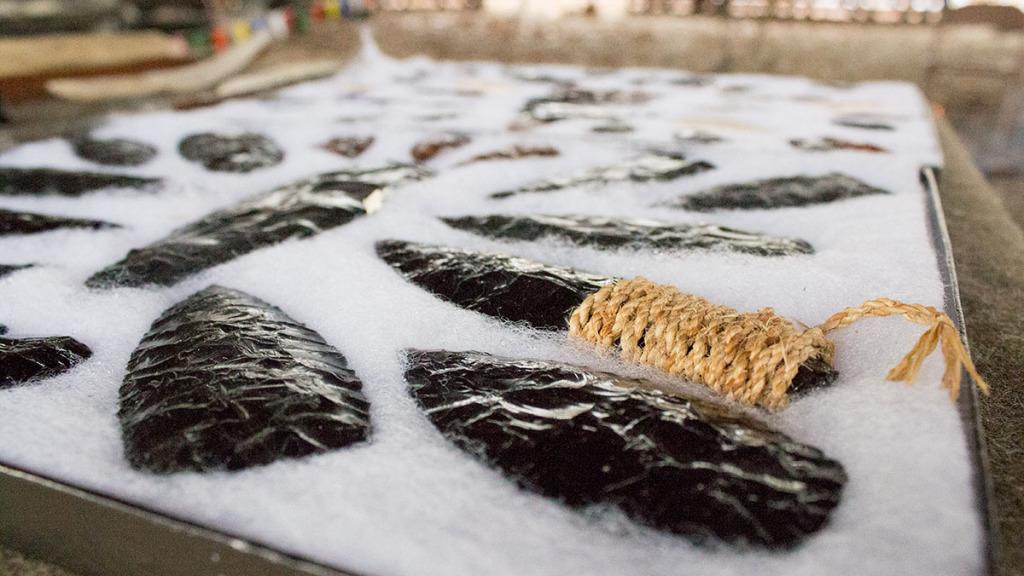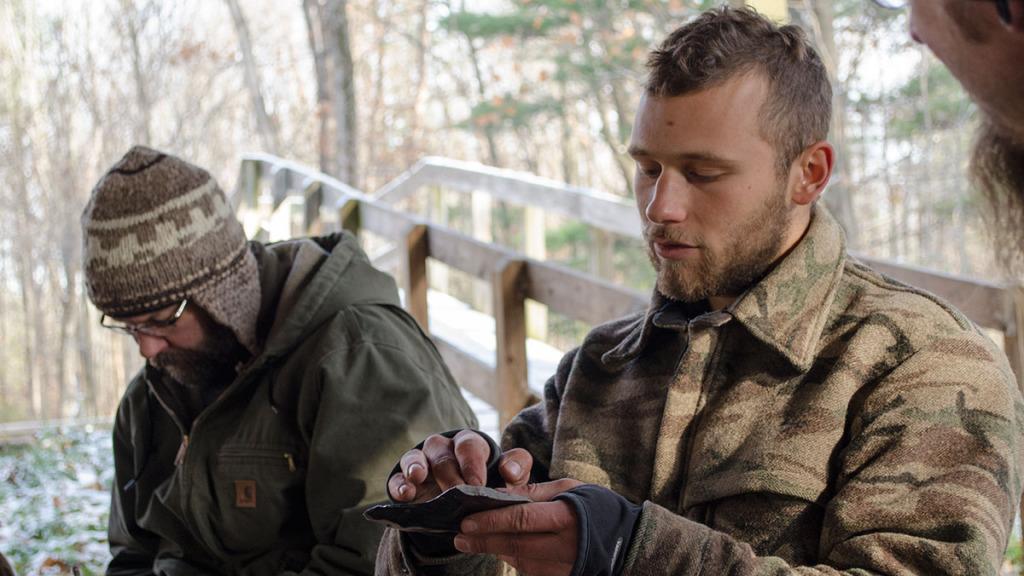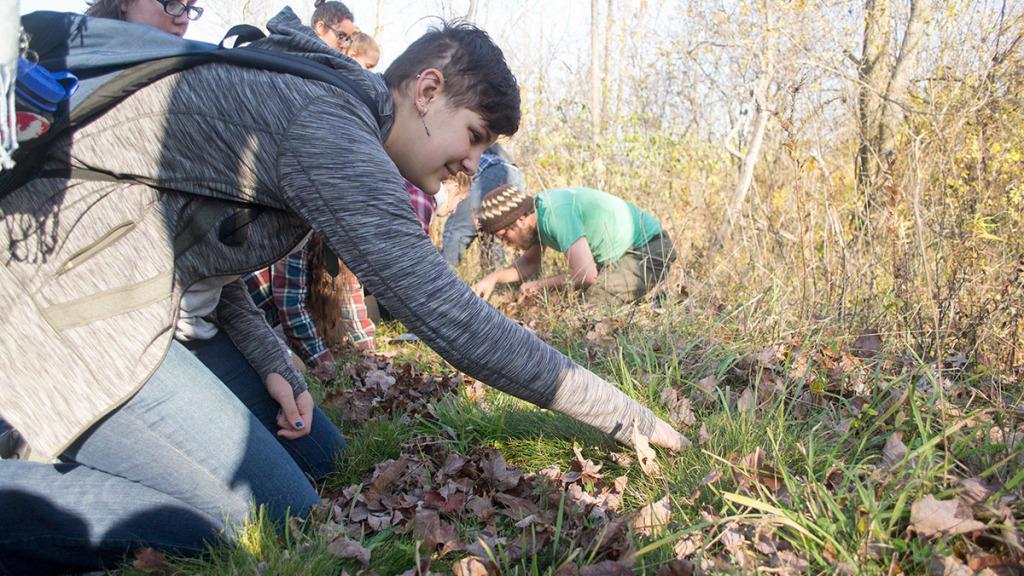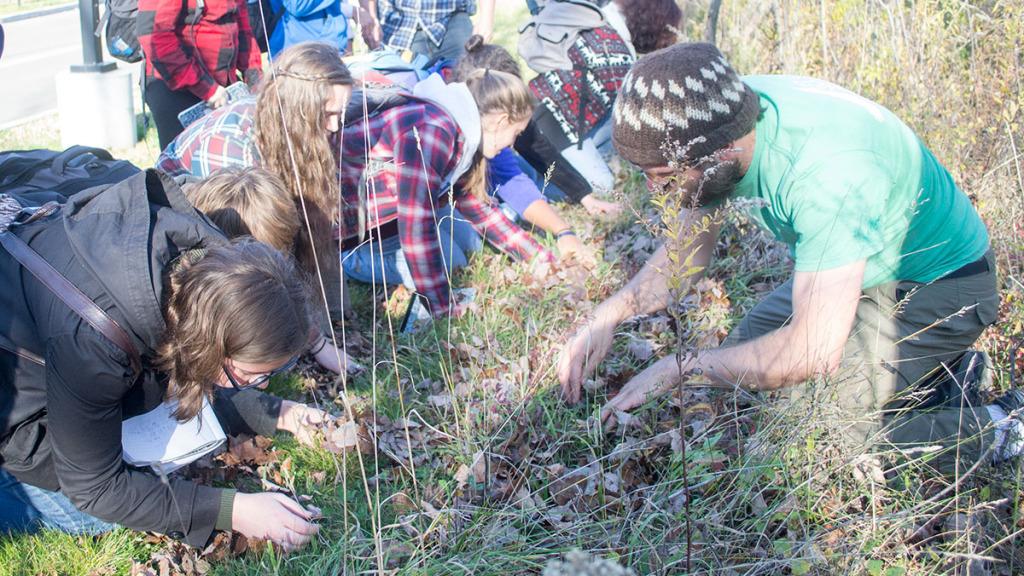A city in the woods
Holding their field journals at their sides, a line of students meanders through the brush. Across each of their notebooks, it reads “Environmental Sentinels.” Dodging the gnarled, reaching arms of the surrounding bushes, they plunge deeper into one of the several expanses of natural lands that Ithaca offers. These wandering students are following a winding trail that cuts through this wilderness, delving further into a sea of towering trees and aimlessly strolling deer.
With this sprawling range of natural lands, it’s no wonder an organization is taking advantage of it. Primitive Pursuits, an Ithaca-based survivalist organization, is using as much of this surrounding nature as it can and intends to spread it’s enthusiasm for hands-on, in-the-field exploration of the natural world. Offering classes for both adults and children that focus on primitive skills including bow making, arrow making and more, Primitive Pursuits allows members of the local community to pursue their naturalist inclinations.
The history of Primitive Pursuits, and its impact on the Ithaca area, can be traced back to humble beginnings — notably to a small cabin nestled away in the wilderness of Tompkins County.
An island
As a child, Tim Drake grew up on an island with no coast. That’s how the 36-year-old describes his childhood home: a small log cabin, built by his parents, tucked away in the rural suburb of Perry City, near Trumansburg. This island was flanked not by water but by dense, far-reaching wilderness.
Born into a family of hunters and trappers, Drake’s youth was steeped in the natural world around him. He and his family lived off the land, and before Drake turned one year old, his mother would carry him on her back as she checked the trap lines around their home. By age 10, he was wandering the greater wilderness in his free time, and by his early teens, he was already embarking on the first of his life’s many camping ventures. Despite his young age, Drake never suffered any worry from his parents — this desire to adventure, he said, was not an issue of particular concern to them.
“My family was definitely one of those who trusted us to be OK outdoors, so I had a lot of liberties as far as roaming,” Drake said. “They either had faith, or a lack of awareness. I think they were like, ‘You’re going to come home if you’re cold.’ They didn’t say that, but I assumed that’s what they must have been thinking.”
When he was 14 years old, Drake’s best friend and neighbor gave him a book written by famous American tracker and survivalist Tom Brown Jr. This, he said, turned what was initially an interest for the natural world into a passion for survival skills.
“That kind of opened up this whole new world for me,” he said. “I just started really exploring those skill sets and wondering how I could improve my situation and experiences outdoors.”
Decades later, Drake has honed his outdoor skills — he can birth fire from mere friction and will often nibble on the edible plants he identifies around him. However, he’s hasn’t kept this knowledge to himself: Drake is one of three founding members of Primitive Pursuits and is ardent in his goal to spread knowledge and awareness of the natural world to budding naturalists throughout the upstate New York area, including those on the Ithaca College campus.

Beginning the Pursuit
Primitive Pursuits began, and still exists, within the Cornell Cooperative Extension, a division of Cornell that develops and nurtures community programs and initiatives. Started by co-founder Dave Hall in 1999 as a part of the Cooperative’s Rural Youth Services, Primitive Pursuits was originally an after-school program for kids that took them out of the classroom, opting instead to use the woods as a venue for exploration and education.
Drake met Hall shortly after Hall began instructing the program and immediately took interest in its approach. Drake had been supervising similar programs himself and said he often found reception, not from the youths, but the adults, to be lacking.
“I found myself basically taking kids into the woods and just sharing my excitement for it, and watching them be super-excited about it too really hooked me into that feeling,” Drake said. “And then at the same time, there was people who were like, ‘Uh, you’ve got to put their shoes back on.’ I definitely realized that what I was doing was really not in the flow of the status quo.”
Upon volunteering with Hall with Primitive Pursuits in 1999, however, Drake was immediately convinced that the program was the one he wanted to work with.
“I met [Hall] the first year he started doing it and started working with him,” Drake said. “I was like, ‘This is it. This is awesome.’”
The two naturalists were soon joined by a third, co-founder Jed Jordan, and in the following years, Primitive Pursuits began to grow. Requests for their classes became more frequent, and what was once an after-school program was quickly growing into something much larger in scope.
Growing Strong
It’s 9 a.m. on a biting November morning, and Justin Sutera, a year-round field staff member with Primitive Pursuits, is leading a flint-knapping course, part of the organization’s Wilderness Skills Apprenticeship Program. In the 15 years since its inception, Drake, Hall and Jordan’s after-school program has grown into a thriving community organization, now boasting a full staff and a lengthy catalog of survival and tracking opportunities for youths and adults alike.
Flint-knapping is delicate work — a true meeting of force and foresight. It is the creation of a tool by lithic reduction, or removing smaller pieces of stone from a larger core piece. Knappers must read the nuances of each of these cores, noting the angle and shape of it, before striking them with another, harder “hammer” stone. The force of this impact, if directed correctly, peels large flakes off the rock, which can be worked into a bevy of tools.
This is the second flint-knapping workshop in two days, and the group is getting its second chance at chipping away at the stones. The ultimate goal for these budding stone-crafters is to fashion something usable, be it a knife or an arrowhead. The fate of these tools depends entirely on how the knapper strikes, and each action must be planned and purposeful.
“It’s all about you and the rock,” Sutera said. “There’s nothing that’s happening that isn’t all in your control.”
Sutera, a graduate of SUNY College of Environmental Science and Forestry, sits among the booted, bundled workshop attendees. They are all parked around a pile of glinting, ink-dark shards of obsidian. Sutera, whose head is wrapped in a fur-lined hat, is holding a hulking chunk of the black volcanic glass, running his hands over its crooked, jagged form.
“We’re here because this works,” Sutera said, looking around the group, still cradling the stone. “The only reason we’re alive today is because you can rub sticks together and make a fire, and you can break a rock and make a sharp edge and kill something with it.”
Onlookers nod quietly as he speaks, their breath hanging foggy in the air. Wind sails through the space — a sizable pole barn located on Ithaca’s 4-H Acres. Just a few feet from the group, a small fire seethes, crackling in the background.

Charlotte Whalen, an Ithaca resident, is gripping her own piece of obsidian in her hands. Her tasseled scarf hangs over her head, shielding her ears from the chilled wind. Her fingers, red from the cold, are wrapped in Band-Aids. Obsidian flakes, razor sharp, have cut into her fingers. They have not, however, cut into her resolve. The day before, even with her bleeding hands, Whalen said she was hard-pressed to stop chipping away at her stone.
“I didn’t want to stop to wipe the blood off my hands,” she said, holding up her bandaged fingers. At her feet, a box of Band-Aids lies on its side, already opened.
Whalen’s bloodied fingers encapsulate a notion that is integral to the flint-knapping craft — no pain, no gain. Trial and error are vital to the fashioning of these stone tools, proved by the heaping pile of discarded shards and chunks in the center of the circle. Even the ground is a graveyard of misfit stones, which shatter under the feet of those walking around the area.
Bill Hamm doesn’t mind this constant failure. On the contrary, he embraces it. Warming his hands over the fire, the Ithaca resident said the Primitive Pursuits instructors have hammered home a notion that failure is as welcome as success.
“All of these instructors, they really emphasize the fact that you’re not going to learn anything, or nearly as much, if you don’t fail,” Hamm said. “Success is as good of a teacher as failure.”
Ultimately, Sutera isn’t worried if his workshop attendees are succeeding or failing — just as long as they are attempting. Sutera values the hands-on experience most of all and said his goal with workshops like this is simply to provide people a new connection with the natural world.
“They’re crafting something. They’re using their hands. They’re connecting with a natural material,” Sutera said. “Whatever they’re doing, they’re expanding their relationship with the natural world, and I think there’s something there for everyone.”
Between the strikes of her hammer stone, Whalen jokes to the group about her box of bandages and her abused hands. There’s a collective laugh from all of the members, shaking the dusting of glass off their laps and onto the floor. Sutera laughs too, and then strikes his stone: A perfect, black sheet slides off of its face, and the members’ quiet, satisfied gasps fill the circle.
A new learning environment
It was her freshman year, and now-junior Nicole Pouy was out late on a school-night. She was blindfolded, along with several of her other classmates, sitting in the pitch-black darkness of Ithaca’s natural lands, listening for any sound at all.
This was “the” night class everyone was talking about. Not so long before, Jordan and Drake led this group of students into the woods with a single objective: to put the students’ skills to the test — to endure the dark of night-time woods, and ultimately find their way out. Trekking into the woods, Pouy said she had little idea what the night would entail.
“I was thinking, ‘What’s going to happen to me?’” she said. “‘What do they have in store for us?’”
Despite how it may have seemed, this was no sadistic joke at the hands of the aforementioned naturalists. What Pouy was enduring was part of Environmental Sentinels, a collaborative course between Ithaca College and Primitive Pursuits that tackles environmental sciences, tracking and survival with a hands-on, out-of-the-classroom approach.
Sentinels, as it is often called, is partially the work of Jason Hamilton, professor and chair of environmental studies and sciences. Hamilton moved to Ithaca in 2001 and shortly thereafter enrolled his son in some of Primitive Pursuits’ homeschool programs.
Soon, Hamilton became involved with the organization, enrolling in survival skills workshops. He quickly saw an educational opportunity. At that time a professor of ecology, Hamilton struggled to devise inventive ways to interact with students but saw promise in Primitive Pursuits’ approach to environmental education.
“I was looking for creative ways to engage students in ecology that wasn’t just, ‘Hey, look at that bobcat over there,’” Hamilton said. “It dawned on me then, as I was working with Tim and Jed, that this may be the hook — bringing in some of these wilderness-awareness skills that they were teaching into an ecology class.”

From this notion, Hamilton and the minds at Primitive Pursuits crafted Environmental Sentinels, which launched as a special topics course in 2008 and was made a required class for both the environmental studies and environmental sciences majors in 2010. Depending on the section, the class may be led by Drake, Jordan, Hamilton or Jake Brenner, assistant professor of environmental studies and science. Hamilton said one of the larger benefits of the collaboration is having Primitive Pursuits staff on board, consequently benefiting from the skills they bring to the program.
“They brought the primitive skills and the primitive technologies,” he said. “They were the ones who knew how to light fires by rubbing sticks together; they were the ones who knew how to make cordage out of plant material.”
Sentinels takes an approach that values hands-on experience outside of the classroom — what they do varies from day to day, and looking for animal tracks and following deer trails are just a couple of examples. For Pouy, who took the class two years ago as a freshman, removing herself from the classroom setting made for a more intuitive learning experience.
“I feel like after a while it becomes very hard to learn when you are sitting in a desk day after day, for an hour — you just get restless,” Pouy said. “This way, they always had our attention, and we always had to be keeping up.”
Pouy’s comments prove to be a widely held sentiment among classmates. Sophomore Chloe Miller, currently enrolled in the course, said the approach Sentinels takes is not only radically different than that of other classes, but it also eases the learning process.
“Well, not being in a classroom, and the things we are learning about, is unlike anything else I’m taking,” Miller said. “I feel like I’m learning a lot more, and a lot more vital things.”
For Pouy, her freshman year is far behind her. She did eventually traipse out from the natural lands that fateful evening, despite being blindfolded the entire time. Even with the momentary emotional distress Sentinels may have caused, she cannot shed her fondness for it and admitted to having a love-hate relationship with the class. However, it wasn’t just this late-night brush with wilderness that made Sentinels an enlivening experience for her. Pouy said it was the relief from the classroom setting that established Sentinels as an educational experience she won’t soon forget.
“It was the best and the worst class of my entire life, but it’s a nice break from conventional schoolwork,” she said. “This gets old, you get tired, you get kind of down — [Sentinels] wakes you up.”
The Original Classroom
At the end of it all, for Drake, the plight of Primitive Pursuits is not merely grounded in the dissemination of survival skills. Ask him why he has taken to the primordial techniques of yesteryear, and he’ll retort, with confidence, the mentality behind these truly primitive pursuits: a celebration of what has brought humans so far.
“Sure, we could flick a lighter — we no longer have to make fire with a friction kit,” Drake said. “The reason we explore these primitive skills in depth and really work with them is because they are literally the skills that brought modern humans to be the successful creatures that we are today. We call the forest the original classroom: the place where we learned to be who we are.”














